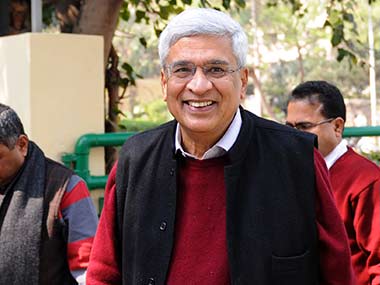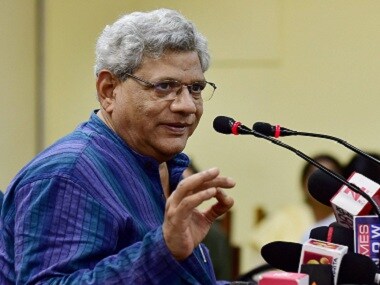In July 2008, then CPM general secretary Prakash Karat, disregarding the opposition of Bengal party leaders and defying the sage advice of party patriarch Jyoti Basu, withdrew support from the United Progressive Alliance government. To Karat's chagrin, his reckless decision failed to topple the Congress-led coalition government at the Centre, but it certainly dealt a body blow to the Left parties, particularly the CPM.
In the 2009 General Election, the Congress returned to power with greater strength while the Left Front’s tally came down from 60 to 24. The sharp decline in its number of Lok Sabha seats in West Bengal in 2009 from 35 to 14 heralded the beginning of the end of the three-decade-long Left hegemony in the state. What the visionary Basu had foreseen in 2008, came to the fore three years later. By parting ways with the Congress, Karat and company paved the way for arch rivals Trinamool Congress to enter into an opportunistic alliance with its erstwhile parent organisation.
The Congress-TMC combine spelt doom for the CPM that had been weakened by the follies of Buddhadeb Bhattacharjee. The Alimuddin Street (CPM headquarters in Kolkata) bosses still believe that despite the Nandigram and Singur fiascos, the Left Front might have survived had Mamata Banerjee not been presented on a platter the opportunity to ensure a consolidation of anti-Left votes by forging an electoral tie-up with the Congress. The downfall of the Left and CPM continued in the 2014 Lok Sabha and 2016 Assembly elections.
One false step taken by a dogmatic Karat 10 years ago has led to the near-irrelevance of the CPM in Bengal.
That he has not learnt any lesson from past blunders became evident last week when he prevailed upon the majority of the CPM's central committee members to reject party general secretary Sitaram Yechury's draft political resolution advocating a tactical alliance or an understanding with the Congress ahead of the next General Election in 2019. A few months ago, the Karat camp had denied Yechury a third term in the Rajya Sabha. Although the reason cited was the party rule that prohibits a leader from serving more than two terms in the Upper House, Karat possibly also could not stomach the idea that Yechury would be renominated with the support of Congress MLAs in Bengal. The absence of a brilliant speaker like Yechury has made life so much easier for the ruling BJP in the Rajya Sabha.
Now after he lost face in the central committee in Kolkata on the Congress issue, Yechury may not last long as party general secretary. If this happens, it will be another setback for the beleaguered CPM. It seems Karat and his friends who support his blind visceral opposition to the Congress are hellbent on driving the CPM into oblivion. By toeing the Karat line, the CPM has exposed its hypocrisy and double-speak.

File image of Prakash Karat. AFP
Its resolve to fight the communal forces tooth and nail is nothing more than empty rhetoric. You cannot fight communal forces by weakening the secular parties. There was a time when the CPM mandarin's policy of maintaining equidistance from the Congress and BJP made political sense. But after the dramatic rise in the BJP's fortunes in the early 1990s, CPM stalwarts Harkishen Singh Surjeet and Basu rightly perceived the Congress as "the lesser evil" and shed their old hostility towards it. They understood the urgent need of all secular parties to close ranks and unite against the communal forces. It was this new approach that resulted in the Left parties' extension of outside support to the minority Congress government led by PV Narasimha Rao in 1991.
Shocked by the 2002 pogrom in Gujarat, the CPM and Left parties realised that if the communal forces were not stopped in their tracks, they would pose a serious threat to the pluralistic fibre of the nation. It was this concern that made Surjeet play a key role in the formation of the first Manmohan Singh-led UPA government in 2004 in order to to stop the BJP-led NDA from returning to power.
However, only a year later Surjeet had to resign due to advancing age and failing health. In April 2005, Karat became the party general secretary. He withdrew support from the UPA-1 on the issue of the India-US nuclear deal. Thus he undid in just three years, what his far more illustrious predecessor had painstakingly achieved over several years: Consolidation of secular forces. Little wonder that the BJP is celebrating the outcome of the CPM's three-day central committee that concluded in Kolkata on Sunday.
On the one hand, the CPM central committee's draft resolution said the main objective of the party is to "defeat the Bharatiya Janata Party" and it will spare no effort in "mobilising all secular democratic forces" in pursuit of this goal. And on the other, Yechury’s sane and practical proposal for a tactical understanding with the Congress was comprehensively rejected.
In 2008, Karat had not only pulled the rug from under the UPA-1, he had committed another blunder. He was instrumental in expelling a tall leader like Somnath Chatterjee from the party when he refused to step down from the post of Lok Sabha Speaker. Chatterjee, like Basu, was until the last moment opposed to the withdrawal of support to the UPA-1. Chatterjee, who still retains immense love and affection for the CPM, was anguished by the central committee’s latest decision. He said it was another mistake that would cost the party dearly.
He must have been referring to not only the withdrawal of support from the UPA-1, but also the refusal of the party mandarins to allow Basu to become Prime Minister of India in 1996. A Communist at the helm in Delhi, might have changed forever the face of Indian polity. But this was not to be. The dogmatic party committed what Basu would later describe a "historic blunder". The pity is it has continued to make a series of blunders since then.
Mukul Roy, who was then TMC general secretary, had once bragged that his party would decimate the CPM to such an extent that one would not be able to find it even with a microscope. With friends like Karat, the party does not need any external enemies. One should not forget that Basu had serious reservations about Karat’s political skills. Just days before Karat became party general secretary in April 2005, then US ambassador David Mulford had sent an extensive cable to Washington evaluating Karat and his party. "CPM icon Jyoti Basu (is) concerned that Karat will not be as adept at handling the Congress or even the Left Front coalition as well as Surjeet (Harkishan Singh Surjeet)," it read. This revelation that surfaced in September 2011 courtesy WikiLeaks proved that Basu’s apprehensions were not misplaced.
The author is former resident editor of The Asian Age (Kolkata bureau)
Published Date: Jan 24, 2018 13:21 PM | Updated Date: Jan 24, 2018 13:21 PM



















